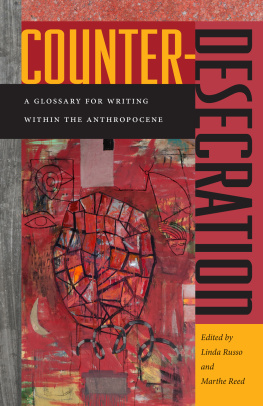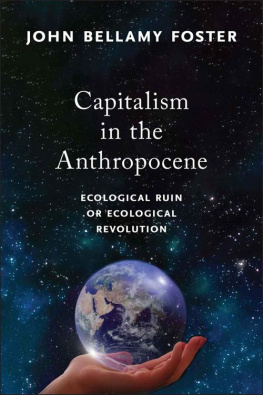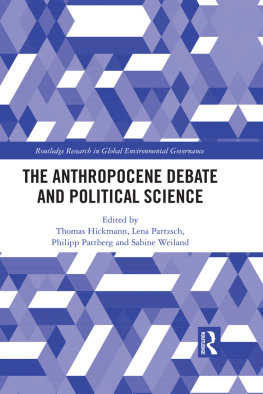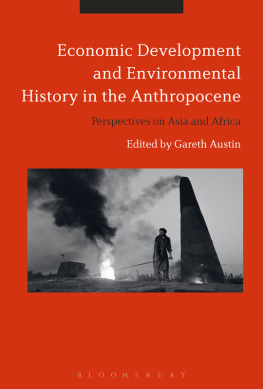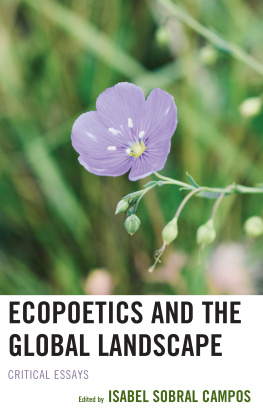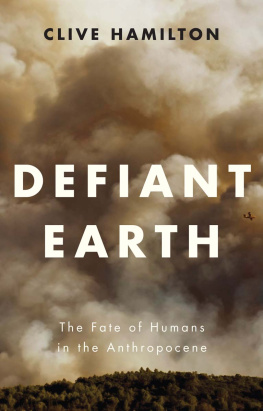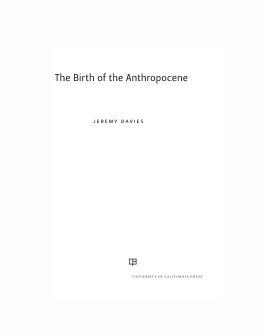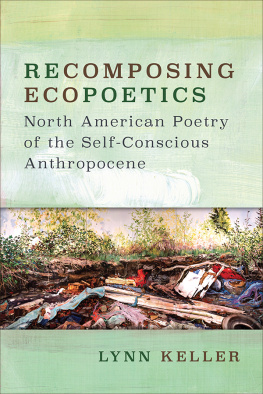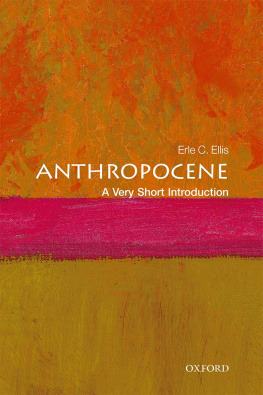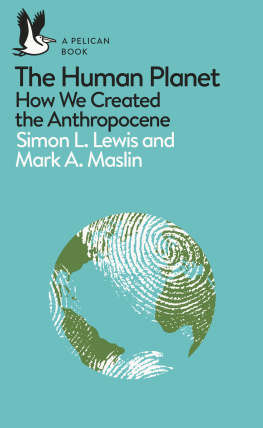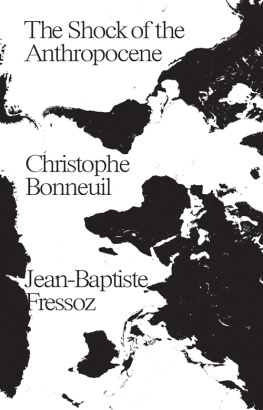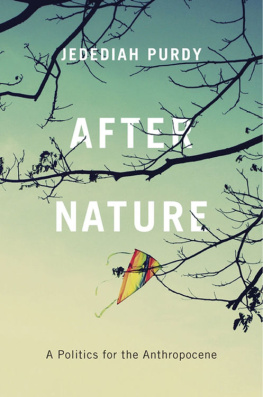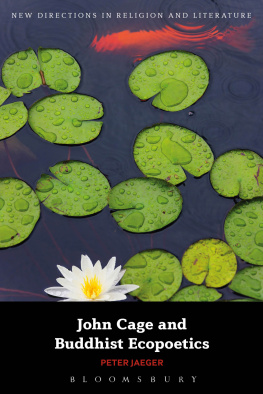
COUNTER-DESECRATION
Edited by Linda Russo and Marthe Reed
COUNTER-DESECRATION
A Glossary for Writing within the Anthropocene
Wesleyan University Press | Middletown, Connecticut
Wesleyan University Press
Middletown CT 06459
www.wesleyan.edu/wespress
2018 Wesleyan University Press
All rights reserved
Manufactured in the United States of America
Designed by Mindy Basinger Hill
Typeset in Minion Pro
Library of Congress Cataloging-in-Publication Data
available upon request
Hardcover ISBN: 978-0-8195-7845-7
Paperback ISBN: 978-0-8195-7846-4
Ebook ISBN: 978-0-8195-7847-1
54321
Cover illustration: Turtle Island, 2011, Jaune Quick-to-See Smith. Courtesy the artist and Garth Greenan Gallery, New York.
To indigenous peoples, to peoples of island nations and the Sundarbans imminently imperiled, and to all other beings suffering in the Anthropocene
t
t
t
t
t
t
t
t
Sherwin Bitsui | t
Navajo for water
CONTENTS
ALLISON ADELLE HEDGE COKE
PREFACE
This glossary delivers terminological impression of shifts in language and in consciousness fostered to address the perilous state of today. Continually fed now since Euro-invasion, intentional attempts at extinction/slaughter of the Western Hemispheres indigenous peoples (estimates say that 75 to more than 100 million people rapidly perished at the hands of the Euro-invader and his diseases) undoubtedly spurred the initial methane surge of the Anthropocene. This is, immediate and dire, an enduring era of environmental injustice, survivance under unequal protection from colonial, imperial resourcing, with political sabotage by collective lessening of efforts to combat climate change. Now, in the Sixth Extinction epoch segment, we strive to locate lingual succinctness in attending to the multitudinous expression with participatory means to discern and disseminate information necessary to better the state of the world for all peoples and all lives dependent on our shared planet. Moreover, we strive to employ as vernacular this nomenclature and vocabulary in idiolect of intentional lexicon while gathering activist effort for gross intervention, reclamation, renewal, revivance, and restoration, by whatever means necessary to keep this world inhabitable and whole beyond what damage has already diminished its complete viability.
In imagining a book that would clarify the new ways that we respond to the call our earth, her oceans, and the surrounding atmosphere surely sing, Counter-Desecration brings sustenance and power with terms made in collective remedying. From dysoptics to echolocution, reciproesis to terrotic, the countenance of communication encounters the need of a global population on its mettle. Torpor (the rest state required of an activist) and vivitocracy (a social mind-set built on the idea that all life deserves equally to exist) bring a sense that our collective strength and support of the planet might still replenish and recover her ability to continue, and thus we along with her, or at least give a sense of the hope for future life here. This book allows us fortitude and wisdom to secure what means we might to continue to cherish and to equip us to protect our planet with concise and meritorious language and action: a generous undertaking for which I am exceptionally grateful and believe indispensable for writers, speakers, readers, and researchers working for vital cause and solution.
ACKNOWLEDGMENTS
LINDA RUSSO: A testament to the beautiful, fierce, generous heart of Marthe Reed, this book is dedicated to her memory. I wouldnt have wanted to do it without you, Marthe. Thank you Allison Adelle Hedge Coke for your powerful preface. Thank you Christine Leclerc and Brenda Iijima for curatorial assistance, and thank you Julia Bloch, the editor of Jacket2 who unwittingly provided the forum to commence this project. Finally, I wish to thank, always, my family, for sustaining (with) me in many ways.
MARTHE REED: Gratitude to Linda Russo for imagining this project, to our contributors whose collaboration gave vision form, and to Mike, who makes everything possible.
LINDA RUSSO
ENTANGLED & WORLDLY
Approaches to Anthropocene Writing
Without deep reflection, we have taken on the story of endings, assumed the story of extinction, and have believed that it is the certain outcome of our presence here. From this position, fear, bereavement, and denial keep us in the state of estrangement from our natural connection to the land.
Linda Hogan | Creations
In a substantially altered world, when sea-level rise has made cities like Kolkata, New York, and Bangkok uninhabitable, when readers and museum-goers turn to the art and literature of our time, will they not look, first and most urgently, for traces and portents of the altered world of their inheritance? And when they fail to find them, what should theywhat can theydo other than to conclude that ours was a time when most forms of art and literature were drawn into modes of concealment that prevented people from recognizing the realities of their plight? Quite possibly, then, this era, which so congratulates itself on its self-awareness, will come to be known as the time of the Great Derangement.
Amitav Ghosh | The Great Derangement: Climate Change and the Unthinkable
Staying with the trouble requires making oddkin; that is, we require each other in unexpected collaborations and combinations, in hot compost piles. We become-with each other or not at all. That kind of material semiotics is always situated, someplace and not no place, entangled and worldly. Alone, in our separate kinds of expertise and experience, we know both too much and too little, and so we succumb to despair or to hope, and neither is a sensible attitude.
Donna Haraway | Staying with the Trouble
Over twenty years ago, Linda Hogans essay Creations clarified a need for new terms and conditions that are relevant to the love of land, a new narrative that would imagine another way. Many have lived another way, many have imagined, many have faltered, and many have not: the narrative of advancement at any cost remains dominant, and here we are. Given what we know, how will, and can, we respond? Will we resist, with Hogan, the story of endings? Confront, with Amitav Ghosh, what it will take to avoid the Great Derangement? Override despair, with Donna Haraway, by creating new ways to stay with the trouble? The purpose of this glossary is to provoke possibilities for responsive writing within the Anthropocene, as defined both by the ongoing machinery of the carbon-fueled economy of late capitalism and the corresponding disruptions to planetary systems, and the corresponding disruptions to economic and social orders, and the corresponding reexamination and adjustment of those orders, and so on. It proposes that approaching any place as actively shaped and bearing social and environmental histories of wildness and settlement is one way to begin to respond. It further proposes that anyone can embed themselves in the sites and corresponding ecological systems that we modify for dwelling, preserve as wilderness, or cultivate for profit around the globe, engage pressing questions, generate new methods of inquiry, report back on the state of our living world(s).
We come across key words that help us understand our relationship to what we know and try to know. We invent these words for each other to use, or we repurpose them, keeping language vital. Entangled and worldly: we are all somewhere and each connected to myriad life-forms. Can we write response-ably, responsively, to our time and places as a way of remaking where (and how) we find ourselves?
Next page
